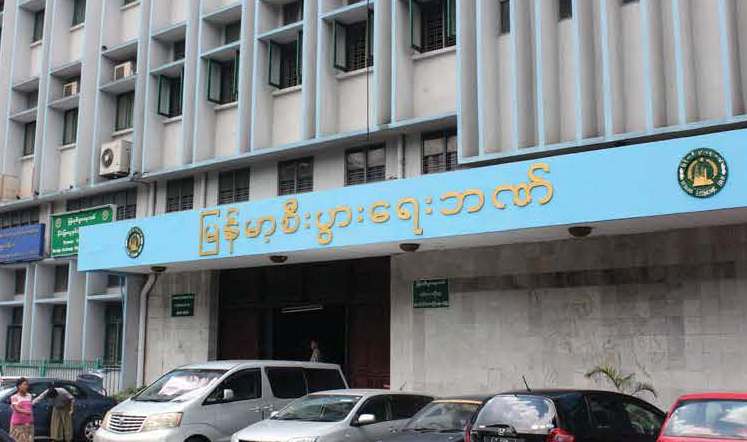Domestic banks have been slowed to act on a Central Bank of Myanmar's decision to allow equity injection of up to 35 percent by foreign banks to invest in their operations
6 Mar 2019
Domestic banks have been slow to act on a reform allowing equity injections of up to 35 percent by foreign banks, with some citing continued confusion over the rules.
DOMESTIC BANKS have been slow to act on a Central Bank of Myanmar decision that allows foreign banks to invest in their operations, with industry sources attributing their hesitation to a failure of the Central Bank to provide clarity over the change.
A Central Bank regulation issued on January 29 that formally allows foreign banks to have up to 35 percent equity in Myanmar banking institutions was broadly welcomed by a business community eager for greater access to finance.
A senior Central Bank official who asked not to be named told Frontier that up to the third week of February, they had yet to receive a proposal from a local bank for foreign equity participation. Some bankers said they were still unsure whether the regulation applied equally to public, private and state-run banks.
U Than Lwin, senior adviser at privately owned KBZ Bank, said the regulation, which implements provisions of the Myanmar Companies Law that took effect on August 1 last year, lacks clarity.
“They need to publicly define it,” he said, referring to the Central Bank.
Central Bank deputy governor U Soe Thein confirmed to Frontier that the regulation applies to all banks in Myanmar but declined to comment further.
Members of the business community say that enabling foreign banks to invest in local banking institutions will make more capital available for investment and benefit the economy.
“Up until now, I’ve not heard about any foreign banks preparing to acquire equity in local banks,” said Dr Soe Tun, president of the Myanmar Automobile Manufacturers and Distributors Association.
“However, if such equity participation could really happen, the local banks would get not only capital but also the technology and the global experience [of foreign banks],” he said.
There would also be the potential for local banks to offer a new package of services to business customers, Soe Tun said.
DFDL Myanmar, a legal and tax consultancy, says the equity decision is a significant development in the country’s banking sector because it will allow local banks to expand their services and operations.
“Foreign shareholdings in local banks would also boost the efficiency and quality of services provided by these local banks and thus make the banking sector in Myanmar a lot more progressive and akin to international standards,” DFDL said on its website.
U Pe Myint, adviser at privately owned CB Bank, said there would need to be close monitoring to ensure that small banks were able to manage equity investments by foreign counterparts.
“But foreign banks won’t get involved if they don’t think they will properly benefit,” he said, adding that it was vital for Myanmar to improve its business environment.
“We need to manufacture and export more and more; we’re still not good at mass production. We need to be able to demonstrate our market potential before the foreign banks will take equity [in local banks],” he said.
Banking industry sources say they expect that local banks will be keen to collaborate with foreign lenders. However, they note that privately owned banks need to meet share allocation requirements in order to work with foreign banks. Public banks, however, can immediately take advantage of the regulation on equity investment, they say.
First Private Bank and Myanmar Citizens Bank are the only banks that are listed on the Yangon Stock Exchange, though several other publicly owned banks operate in Myanmar.
“Frankly, owners of some local banks just want to run them with their own capital,” said U Kyaw Soe Min, the chief operating officer at privately owned AYA Bank, suggesting that they feared any loss of control over their banks.
He said these owners, who he did not name, saw the move to allow foreign investment in their banks as more “pressure” from the Central Bank to increase their capital.
The pressure comes amid concern over a potential credit crunch among domestic banks, many of which are thought to be overly leveraged, in a context of limited public information about banks’ balance sheets.
However, Kyaw Soe Min said that serious risks could accompany foreign banks buying up to 35 percent equity in Myanmar banks without structural reform in the latter institutions.
“As you know, the corporate governance of the local banks still needs improvement. So, foreign banks needs to carefully consider before buying minority shares in these often unruly business.”
Since 2014, 13 foreign banks have been permitted to provide limited services in Myanmar, which has 24 domestic banks, including state-owned institutions.
In November, the Central Bank allowed foreign banks to provide loans to Myanmar businesses provided that the latter met certain corporate governance benchmarks. Foreign banks could previously only lend to foreign-owned companies and joint ventures.
Since December 2017, foreign banks have also been permitted to provide export finance and related services to Myanmar-owned companies, but they remain barred from providing banking services to individual Myanmar citizens.
(Frontier Myanmar: https://frontiermyanmar.net/en/uncertainty-clouds-bank-equity-move )











